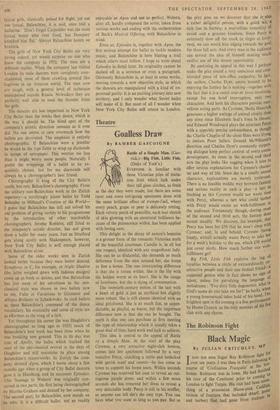Theatre
Goalless Draw
By BAMBER GASCOIGNE
EVERYONE is familiar with those Victorian piles of imita-
tion fruit which lurk under
rarer and more intriguing specimens done with the same brilliant effect of trompe-rceil, where every peach, grape or pear is delicately rotting. Each velvety patch of penicillin, each taut stretch of skin glowing with an unnatural brilliance be- cause of the putrescence within, has been applied with loving care.
This delight in the decay of nature's beauties is a grosser form of the romantic Victorian myth of the beautiful courtesan. Camille is, in all but one respect, identical with any magnificent lady. She can be as disdainful, she demands as much deference from the men around her, she keeps as fine a house. The one intoxicating difference is that she is rotten within. She is the lily with the hidden worm at its heart. She is the image of loveliness, but she is dying of consumption. The twentieth-century notion of the tart with a heart of gold is just as mythical but slightly more robust. She is still almost identical with an ideal girl-friend. She is as much fun, as unpre- dictable, as playful, as warm; but the important difference now is that she can be bought. The myth is that one can purchase at first meeting the type of relationship which it usually takes a great deal of time, hard work and luck to achieve.
This idea is central to the appeal of Rattle of a Simple Man. At the start of the play Cyrenne, a very attractive night-club hostess, comes into her apartment followed by a very tentative Percy, clutching a rattle and bedecked with garish scarf and rosette—he has come to town to support his home team. Within seconds Cyrenne has removed her coat to reveal an out- rageous purple dress; and within a few more seconds she has removed her dress to reveal a very delectable body. Percy is still in his muffler, so anyone can tell she's the easy type. You can have what you want as long as you pay. But as the play goes on we discover that she is also a rather delightful person, with a quick wit, a
rich line in fantasy, a marvellous versatility of
mood and a genuine kindness. Since Percy is extremely slow off the mark (a virgin at forty- two), we can watch him edging towards the goal for three full acts. And every man in the audience can savour the idea of himself making much swifter use of this dream opportunity. By analysing its appeal in this way I perhaps make the play sound a very conscious and cold- blooded piece of box-office carpentry. In fact. the author, Charles Dyer, seems himself to be enjoying the fantasy he is making—together with the fact that it is a comic tour de force involving, except for one brief interruption, only two characters. And both his characters provide mar-. vellous acting parts. As Cyrenne, Sheila Hancock. generates a higher wattage of animal vitality than any siren since Elizabeth Seal's Irma la Douce; and Edward Woodward plays the reluctant Percy with a superbly precise awkwardness, as though the Charlie Chaplin of the silent films were trying to imitate Peter Sellers. Donald McWhinnte's direction and Charles Dyer's constantly surpris- ing dialogue keep perfect control of every comic development. At times in the second and third acts the play looks like sagging when it tries to offer serious explanations for Cyrenne's charac- ter and way of life. Since she is a totally unreal character, explanations are merely irrelevant. There is no feasible middle way between fantasy and serious reality in such a play—a tart as fetching as this Cyrenne would not waste time with Percy, whereas a tart who could bother with Percy would excite no wish-fulfilment in the audience. Fortunately though,- during most of the second and third acts, the fantasy does mount steadily. We discover, for example, that Percy has been bet £50 that he won't sleep with Cyrenne; and, lo and behold, Cyrenne (het" lonely, withal) actually wants Percy to take her for a week's holiday to the sea, which £50 would just cover nicely. How much farther can wish' fulfilment go? Big Fish, Little Fish explores the tug of loyalties between a circle of extraordinarily un- attractive people and their one mutual friend—a, supposed genius who in fact shows no sign of talent, unless for parodying the language OL melodrama: 'You dirty little degenerate, what in God's name do you take me for?' he barks, when a young homosexual takes hold of his hand. The brightest spot in the evening is a fine performance by Hume Cronyn, as the only member of the fan club with any charm.


































 Previous page
Previous page